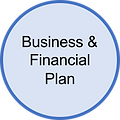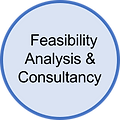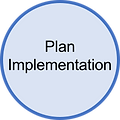

Dialog Consulting

About Us
At Dialog Consulting, we partner with businesses to unlock their full potential through strategic thinking, innovation, and sustainability. Established in 2017, we have helped organizations across Europe transform their ideas into impactful results. With expertise spanning strategic consulting, funding solutions, and market expansion, we empower businesses to achieve sustainable growth.
Our Vision
Driving growth and innovation through smart funding solutions.
Business Innovation Framework








Services

Business Innovation Strategy Process
Objective
Activities
Key Actions
Deliverables


I. Define the problem
Identify unmet market needs and customer pain points.
-
Conduct market research and customer interviews.
-
Perform a SWOT (Strengths, Weaknesses, Opportunities, Threats) analysis.
-
Review internal processes and performance metrics.
-
Prioritize problems based on impact and feasibility.
-
Formulate clear problem statements.


II. Generate business ideas & identify business models
Develop innovative solutions addressing the defined problems.
-
Analyze emerging technologies and their applicability.
-
Explore case studies and best practices in similar markets.
-
Conduct ideation workshops with external experts.
-
Evaluate ideas for viability and alignment with business goals.
-
Select promising ideas for further development.


III. Gather data to validate or invalidate assumptions
Validate the customer demand and willingness to pay.
-
Develop and test minimum viable products (MVPs).
-
Analyze market data and trends.
-
Perform competitor analysis.
-
Conduct pilot projects or beta testing.
-
Collect and analyze data to test assumptions.
-
Adapt ideas based on feedback and insights.


IV. Build the Business Plan
Create a comprehensive plan for business implementation.
-
Define business objectives and strategies.
-
Develop financial models and projections.
-
Identify key resources and partnerships.
-
Plan marketing and sales strategies.
-
Develop realistic and achievable milestones.
-
Prepare risk assessment and mitigation strategies.


V. Estimate the value of the Company to raise funds
Determine the financial valuation of the business idea.
-
Conduct valuation analysis (DCF, comparables, etc.).
-
Prepare investment pitch and supporting materials.
-
Identify and engage with potential investors.
-
Develop an investor relations strategy.
-
Network and build relationships with potential investors.
-
Adapt pitch and strategy based on investor feedback.
Strategy Diagnostics & Business Model Canvas for selected ideas + Market Analysis + Strategy Validation.
Comprehensive Business Plan & Financial Projections and Budget.
Investment Engagement Report & Investor Pitch Deck and Materials.
Methodologies
Our Approach to Environmental Sustainability


Use of Renewable Resources
-
Innovative Solutions: Advise on the adoption of on-site renewable energy sources like solar panels and wind turbines, and the procurement of green energy from suppliers.
-
Benefits: This reduces energy costs in the long term, provides energy security, and enhances the SME's reputation as a green business.
Cleaner Production
-
Innovative Solutions: Implement lean manufacturing processes to minimize waste and improve efficiency. Introduce eco-design principles to reduce material usage and enhance recyclability.
-
Benefits: Significantly lower production costs, reduce environmental impact, that additionally lead to product innovations giving a competitive advantage.
Technology for Sustainability
-
Innovative Solutions: Integrate advanced technologies like IoT for smart energy management, use AI for optimizing resource use, and employ blockchain for transparency in sustainability reporting.
-
Benefits: Substantial cost savings, enhanced operational efficiencies, that additionally help in complying with regulatory standards and achieving sustainability certifications.
Sustainable Supply Chain
-
Innovative Solutions: Develop criteria for selecting sustainable suppliers, promote a circular economy within the supply chain, and use sustainable logistics solutions.
-
Benefits: Mitigate risks, reduce costs, and improve the sustainability profile of the SMEs, thus attracting conscious consumers and investors.





Carbon Finance
-
Innovative Solutions: Engage in carbon offsetting projects and invest in energy-efficient technologies.
-
Benefits: Provide additional revenue streams, improve market positioning, and offer tax incentives.
